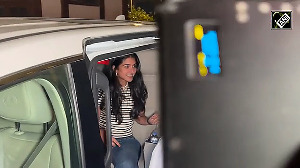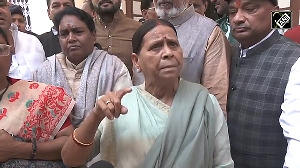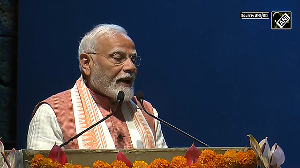
Guftegu bandh na ho, Bat se bat chalen, Subah tak shamemulakat chale, Hum pe hasti hui taron bhari rat chale.(Let interactions never end, let talks lead to further talks, let this evening-meet last till the early hours, let the starry night pass on, cheering us.)
Kashmiris have a 58-year-old dream: to unite their motherland.
If they can't unite politically they want cultural, economical and social bonds to be re-established.
Every morning, the villagers of Silikot, Sahura, Dilawadi and neighbouring areas can see Kashmiris hamlets on the heights of Pir Panjal across the Line of Control in Pakistan occupied Kashmir.
Many have friends or relatives there. But since 1947, they cannot cross over to meet them.
This forces them to resort to unconventional and at times illegal methods of communication. These include shouting or using sign language across stretches where the Neelam river, which divides the two sides, is narrow. At times, letters wrapped around stones are hurled across.
The bridging of a gap of merely 70 km between Uri and Muzaffarabad in PoK was considered impossible after Partition.
But hope was instilled by then prime minister Atal Bihari Vajpayee during his visit to Kashmir in April 2003, when he extended a hand of friendship to Pakistan and initiated the latest peace process. The Srinagar-Muzaffarabad bus service was proposed by India on October 22 that year.
India Pakistan peace talks: complete coverage
But differences over travel papers ensured that the proposal remained just that.
Finally, 18 months down the road, External Affairs Minister K Natwar Singh on his visit to Islamabad February 15 to 17 is likely to finalise the negotiations on the 162 km Srinagar-Muzaffarabad bus service. Sources said special travel papers will be issued by the respective foreign ministries to cross over from Kashmir to PoK.
Initially, India wanted to allow crossing of the LoC from both sides on basis of passports, but Pakistan argued that the LoC is not an international border but a disputed border, and that using passports would give it legitimacy as a border. Instead, Islamabad suggested a local document to be issued by local authorities on both sides of Kashmir.
New Delhi rejected the notion, saying Kashmir is an integral part of India, and that the formalities of international travel should thus be adhered to.
Pakistan had also recommended United Nations monitors at the LoC, India disagreed.
Muzaffarabad bus talks deadlocked
But now it appears that India might show some flexibility.
Pakistan does not mind blurring of the LoC, but believes anything that legitimises the LoC as an international border would be suicidal for their strategic and political thinking on Kashmir since 1947.
With the proposal to use special travel documents instead of passports, Pakistan has won half the battle. Pakistan had also proposed that only Kashmiris should be allowed to cross the LoC by bus near Uri. India has strongly rejected the idea.
Both sides have many other issues with the proposed bus service. Many Indians experts argue that rich traders of Baramulla would increasingly find a market in PoK, which would dramatically reduce their dependence on the domestic market.
India is also wary about the possibility of political solidarity growing between two sides of Kashmir at a time when the situation on the Indian side of Kashmir is showing sign of some stability.
A section of the Indian Army and Indian Intelligence set-up feels since India has fenced the LoC, the flow of terrorists into Jammu and Kashmir via the bus route is possible and India will have to strengthen its civil and paramilitary administration at check-posts on the border.
Other tricky questions which need to be sorted out are whether Indians other than Kashmiris can cross the LoC via Uri? And if yes, will they use passports or the local travel document?
It is well-documented by Indian Military Intelligence (rediff.com was shown satellite pictures) that Pakistan-based terrorist organiations like the Lashkar-e-Tayiba, Jaish-e-Mohammad and the Hizbul Mujahideen have offices in and around Muzaffarabad.
Because of this, Indian flexibility in accepting a special travel pass and not passports for Kashmiris while crossing the LoC may not go down well with hawks in India.
People in the border areas will rejoice because this will mean they can meet relatives and friends living on the other side of the LoC without undergoing the torturous and costly journey via the international border at Lahore. The bus service will help them cut the travel time from two to four days to barely two hours.
 Apart from allowing them to consolidate their cultural and social solidarity, or Kashmiriyat, most people expect the service will lead to a major boom in the region's economy.
Apart from allowing them to consolidate their cultural and social solidarity, or Kashmiriyat, most people expect the service will lead to a major boom in the region's economy.
The real Kashmir valley blooms once you leave Srinagar behind.
From Srinagar, the bus is likely to go through Pattan- Baramulla and Uri before crossing the Chakhoti bridge on the LoC to enter Pakistan occupied Kashmir. It will then run through Kohala to reach Muzaffarabad.
The road, which was built in 1892 after a 10-year struggle, is well-connected up to Rawalpindi.
After Srinagar the first bus station is Pattan, a town dominated by Shias. Farmers of Pattan are well-to do with high-yielding crops of apples and walnuts. They are all set to do business with the other side of the LoC.
The villages around Pattan are infested with Lashkar-e-Tayiba operatives and terrorists.
As you get closer to Baramulla, you pass two palaces once inhabited by the Pandavas (after winning the great war they forsook power and migrated to the Himalayas). Historians claim when the Mahabharata war began, the Gonanda dynasty ruled Kashmir and Baramulla's ancient name was Varahmulla. Although the Pandava palaces are supposed to be maintained by the archaeology department, neither the locals nor the authority care for it.
Only after reaching Baramulla does one realise the hard realities of Kashmir. Ironically, while the army's presence is intimidating to Kashmiris, they feel secure only because of Indian Army troops.
Baramulla was known as the gateway to the Kashmir valley: A small but prosperous town of little more than 10,000 people based on both sides of the Jhelum river.
The town's skyline gives it an exclusive character. Imagine a town encircled by mountains and a river crossing through the residential area. Just a few months ago, it had the largest concentration of terrorists in the valley. Baramulla district has Gulmarg, the Wullar lake and Sopore, which is notorious for terrorist activities.
Most people here enjoy eating the blood red Kashmiri rice grown in the neighbouring town of Tangmulla with beef. They have easy access to Pakistan and Kashmir radio but their hunger for news is satisfied by Alsafa News, whose pages have news in English on one side and Urdu on the other. Most people here follow the azaan relayed by Pakistan radio.
The town boasts of two degree colleges and Internet connections. The district controls around 35 per cent of the apple trade in Kashmir. The apple growers -- many of them are millionaires -- are keen to capture the Pakistani market once the bus service begins. In bad weather their trucks take 10 days to reach New Delhi or Chandigarh.
Though the industry is a huge money spinner, the apple merchants do not have cold storages yet. For them the Srinagar-Muzaffarbad bus service means easy access to two million people in and around Muzaffarabad and beyond Rawalpindi which can be reached in matter of a few hours.
Tejinder Sodhi, a local resident of Baramulla, claims if the bus service begins it will be a boom time for real estate along the road from Baramulla to PoK because it will attract tourists and businesses like never before.
Once you cross the Baramulla the real journey towards the dividing line called the LoC (the cease fire line, which separates India and Pakistan in Jammu and Kashmir since 1972) begins. Foreigners are not allowed to cross beyond Bunyar without special permission obtained from Delhi. The roads are festooned with hoardings which say: 'Kashmir is pride of India, BRO (Border Roads Organisation) is pride of Kashmir.'
As you leave Bunyar one hears less of Urdu. The Pahari and Gujari languages are spoken in Uri and the areas near the foothills of Gulmarg and Bandipora.
The first hour of travel through the road carved out of the mountainside from Baramulla to Uri is through mountains covered with deodar and pine trees. On one side is a valley where small streams of the Jhelum river flows through rock passages.
After Baramulla, both the weather and the architecture changes. The higher reaches are populated by tribes like the Kaka and Bamba.
The roofs of houses are flat. The sweet surprise comes in the form of warmer temperatures. As you travel some 50 km beyond Baramulla, the temperature is noticeably warmer. Locals proudly declare that the weather in Uri is far more pleasant than Baramulla.
Photographs: Amin War






 © 2025
© 2025